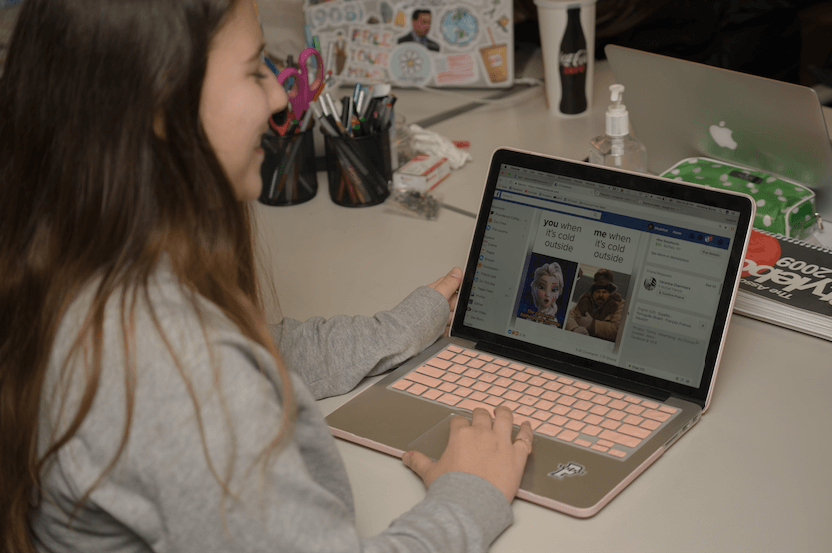by The Cowl Editor on February 2, 2018
Opinion

by Andrea Traietti ’21
Opinion Staff
Technological advances in the past decade alone have changed our lives in nearly every way imaginable. For the most part, these changes seem to be positive. We can easily take a picture at any moment, we can keep in touch with friends even if they are halfway around the world, and we have limitless information literally at our fingertips. But for students, the small device we store in our back pockets may be creating more hurdles than knocking them down.
Scientific research, according to Psychology Today, is now proving that cell phone and app usage is linked to higher rates of anxiety, and even clinical addiction problems. It is critical to evaluate the role of technology in our lives and control our intake of addictive apps, as well as overall usage in order to give our technology a more positive and useful role in our lives.
Many people, not just students, struggle to maintain boundaries when it comes to smartphone usage. However, countless studies have proven that the brains of young adults are more impressionable and prone to obsessive tendencies. Thus, high school and college aged students struggle all the more to control their phone and app access.
This desire to keep checking our phones presents a focus problem, especially when it comes to completing tasks and using effective time management skills. “I think it interferes with my focus because sometimes when I’m not doing interesting homework I check my phone to take a break but then I end up spending 15 or 20 minutes browsing Facebook,” said Kara Berlin-Gallo ’21.
However, this compulsive need to constantly check our phones is linked to far more than the commonly cited “FOMO” or “fear of missing out.”
In fact, research published in Psychology Today by professors and analyzed by Susan Weinschenk, a behavioral psychologist, shows that our smartphones elicit a chemical response in our brains. Receiving a text or a “like” on social media is a form of instant gratification. This instant gratification triggers a cycle of dopamine, a neurotransmitter that increases our desire for something and our willingness and motivation to seek it.
Thus, the problem with cell phones becomes evident: the more texts, “likes,” emails, and comments that we receive, the more we want. We cannot break this dopamine-induced loop because our gratification only makes us want more. And to make matters worse, as Weinschenk states, unpredictability also triggers this dopamine cycle. We never know when someone is going to text us, so we feel the need to seek out those texts and constantly check our phones.
Marketing agencies and social media companies easily take advantage of this dopamine cycle, thus adding to its overall effects. With features like ‘streaks’ on Snapchat, for example, companies try to hook users into a repetitive and constant loop of use.
In her article in Psychology Today, Weinschenk concludes that the only way to break our addiction is to break the dopamine cycle—by shutting off all cues. Essentially, we must ‘quit cold turkey.’
However, to suddenly try to limit or shut off social media and smartphone usage is an extremely difficult task. The best way to go about gaining control of usage is ironically with different apps. Apps like Moment and Onward can help anyone trying to redefine the role of technology in their life, whether they are looking for better focus skills or trying to shut off a developing addiction. Regardless of the intended goal, these apps are important for self-evaluation and students need to take advantage of them.
First and foremost, these apps track usage and can shut off access to apps at certain times of day. For example, Moment asks users to take screenshots of their battery use settings in order to understand the percentage of battery used on specific apps. This way, the program can help target apps that trigger obsessive tendencies. Onward has a similar function, and it can also completely cut off social media app usage by blocking WiFi access for those apps.
In addition to setting different limitations, the apps also aim to fix the more emotional aspects of phone use. Onward, for example, has built in exercises meant for relaxation and reflection. Since distance from our phones spells anxiety for most of us, Onward attempts to ease this nervousness not by allowing users to check their phones, but by forcing them to try to relax in another way.
Overall, we all have a responsibility to understand the role of technology within our own lives. Especially for students it is critical to regain control over the impulse to constantly check our phones. We need to want to change, and we need to be our own advocates in ameliorating our relationships with our phones.